Ethics, Etiquette and Old Family Letters
When it comes to genealogy and reading other people’s mail, ethics and etiquette are two sides of the same coin.
Is it morally correct (ethical) to read other people’s mail?
Is it socially acceptable (proper etiquette) to do so?
Family historians have been uncovering long-buried family secrets long before genetic testing was available. Historians and biographers devour personal correspondence, diaries, and journals for clues to understanding people and events. No one complains that academics shouldn’t read Anne Frank’s Diary or the love letters of Elizabeth Barrett and Robert Browning.
Some argue that famous people give up a right to privacy, and their papers are fair game. But, many people don’t become famous until years after their death, and it’s the writing they leave behind that makes them famous.
In the not-too-distant genealogists will also have the option to run DNA tests using viable samples extracted from sealed envelopes, used postage stamps, and other family artifacts. What kinds of ethical considerations will be asking at that time?
What about the not-so-famous everyday folk like our ancestors? Do they have more rights to privacy than public figures? And what about the deceased: Do dead people a right to privacy? These questions aren’t new, but but they are good questions for any genealogist confronted with a packet of personal correspondence.
3 Questions to Ask About Reading and Sharing Old Family Letters
Although we may overlook old family letters tucked away in obscure archives or libraries, any genealogist with a personal stash of family correspondence will surely include those papers in their “reasonably exhaustive search” of home sources. To reject reading old letters on the basis of “personal privacy” seems counter-productive. The researcher’s act of reading is one thing. Sharing information you learn is another. If you have qualms about reading other people’s mail, it may be helpful to consider these three questions:
1. Who will benefit by reading old family letters?
Every piece of correspondence, including mundane business letters, holds the potential to extend or disrupt pedigrees, to add biographical information to ancestor sketches, and to expand our understanding of the families we study. The genealogist will gain insight to the family and individuals under study, and if the information is shared, a wider audience may benefit as well.
A hand-copied and much-worn letter from my grandmother’s sister revealed the family’s ordeal during a deadly Galveston hurricane in the early 1900s. This first-person account is a rich source of historical detail that would have been lost if not for the reading and widespread sharing of this letter.
You may be the final home for letters written to your ancestors by friends and other family members. I have dozens of letters written to my mother, aunt, and grandmother by their friends. One day, I hope to connect with the descendants of those long-gone letter writers and return the missives to them. Wouldn’t you love to receive a letter your ancestor once penned?
In the meantime, I’ve carefully storing those letters, opened flat with the envelopes intact. Each letter is placed inside acid-free, archival file folders which are then stored inside an archival box in my family history closet. The box protects the fragile paper from light, dust, and small changes in temperature and humidity. I buy my archival supplies in bulk, but the Archival Family Archives Document Preservation Kit is an economical option for a small collection of letters, papers, or photos.
2. Who might be harmed by reading old family letters?
Reading is one thing. Sharing information you learn is another. You’re the reader, and it’s up to you to decide if and when to share what you learn, and who might benefit from that knowledge. Just because you discover an surprising story doesn’t mean you are obliged to share that information. Family gossip isn’t always family history, no matter how interesting it may be.
Not long ago, telephone calls were expensive and mail was cheap; vicious family arguments often crossed the miles leaving written evidence of strong feelings and hasty words. When recent generations are involved, it’s wise to carefully weigh benefit vs. harm before opening old wounds. We can and should include personality and temperament when crafting an ancestor’s biography, with the understanding that honesty does not require brutality nor that we compromise our integrity as a researcher.
3. Is it a breach of good manners to read old family letters?
When I was growing up, personal mail was sacred. We knew that reading other people’s mail was just plain wrong. The anticipation of the sealed envelope, the delight (or dismay) in the message, and the final disposition of the missive all belonged to the addressee, and woe to she who intervened. But what happens when the letter writer or recipient are deceased? Is it still “bad manners” to read those old letters, savor the words, and hear your loved one’s voice again?
As a child, out of sheer nosiness I once opened a letter meant for my father. The lecture wasn’t worth the guilty pleasure. I would never open my parent’s mail if they could handle their own affairs, but life can and does demand rethinking former standards. I’ve also learned from clearing family estates, that you may as well destroy anything you deem “private,” because you won’t be able to do it after you’re gone.
You Didn’t Think We’d Burn Those Letters, Did You?
Having learned this lesson oh so well, you’d think I would resist reading the boxes of correspondence inherited from my grandmother Arline. Not so at all. My father might have been a stickler for private correspondence, but my mother had no such compunctions. And after Arline’s papers moved into my family archive, Mom loved nothing better than sitting at the dining table reading her mother’s old mail. We covered the table with a sheet, washed our hands, and brought out the archival boxes.
Mom’s sister, my Aunt Frances, didn’t approve. She shook head and refused to listen to us as we read gossipy news aloud or commented on Grandma’s wild antics. She said those letters were “private” and “none of our business.” Mom ignored her older sister and continued reading, much to my delight.
Now that I’ve inherited not only my grandmother Arline’s letters and those Arline saved from her own mother, father, sister, and friends, but also letters saved by Mom and Auntie, I’m revisiting the ethics of reading other people’s mail. I may feel comfortable reading Mom and Arline’s letters, but knowing how Auntie felt about “private” papers, it’s surprising that she seems to have saved every letter and every scrap of paper that ever came her way. I wonder what she thought would happen to all those old “private” letters?
How do you feel about reading other people’s mail?
View my video interview with genealogist Amy Johnson Crow for ideas on How to Preserve Old Letters.
This post was first published 22 March, 2016; revised and expanded 6 April 2018.
Thank you for supporting TheFamilyCurator.com by shopping with the affiliate links on this site.
Like this article? Please share!

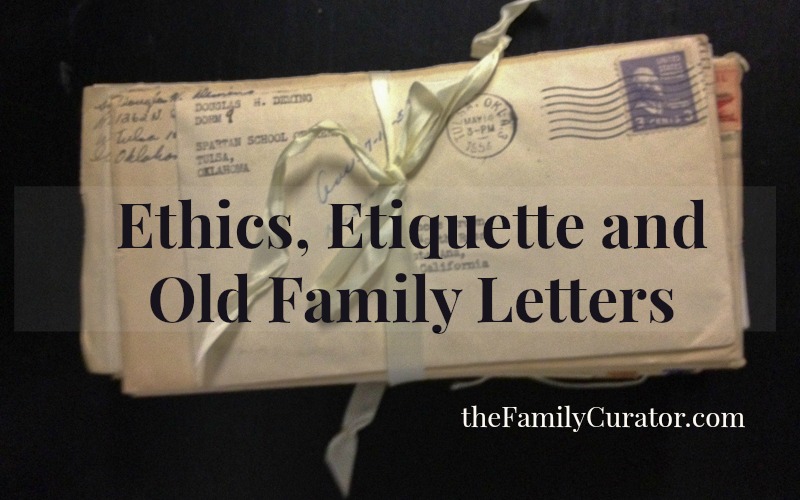
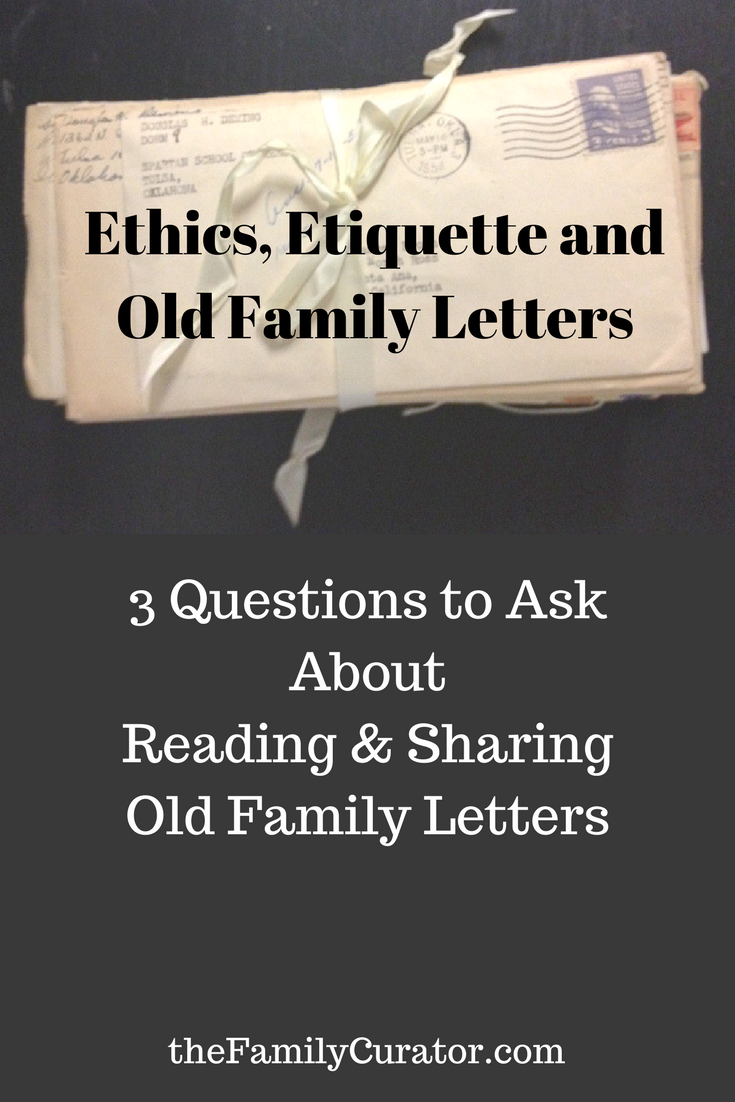
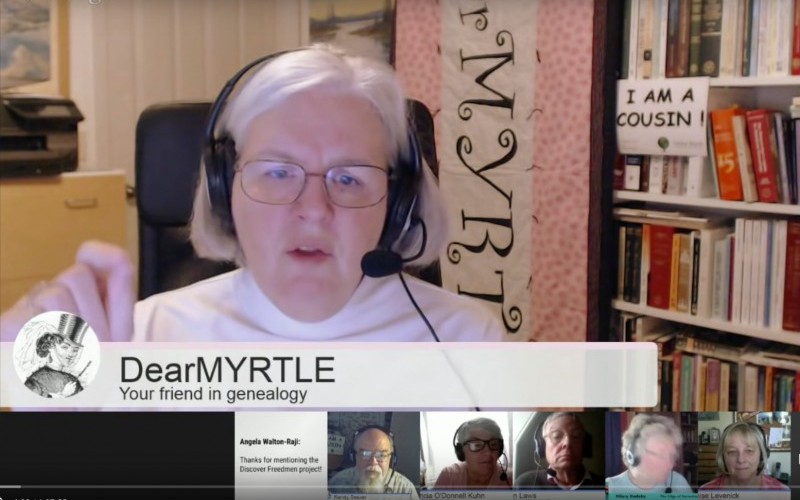
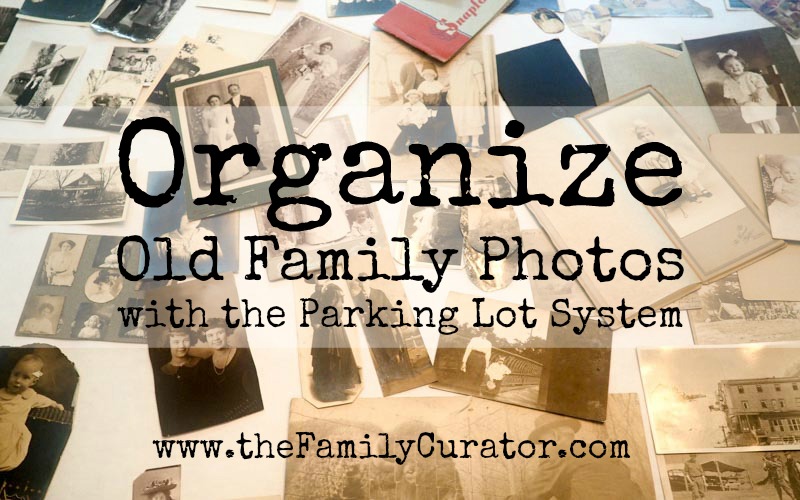

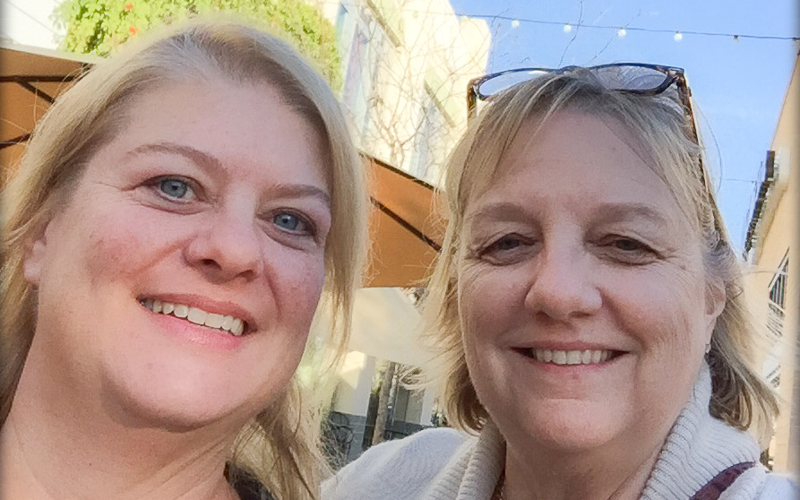
I have included your blog in INTERESTING BLOGS in FRIDAY FOSSICKING at
https://thatmomentintime-crissouli.blogspot.com/2018/04/friday-fossicking-13th-april-2018.html
Thank you, Chris
This is an interesting and helpful blog. thank you. Some readers have referred to journals and I assume that what you’ve written applies to them and diaries. I have a set from a great aunt, from about the 1930s to just before she died in the 1970s. (It’s been a while since I looked at them.) She had no children. Entries run the gamut from mundane to interesting, to personal entries about a family situation that angered her (which I know about). They had births (including mine), marriages, deaths and a few items helpful to research I’m doing.
Yes, diaries and journals are very similar to letters in holding personal thoughts. Many people use a journal to work through emotional difficulties, and I think it’s wise to be especially thoughtful when sharing their writing. I love the 5-year diary with daily events; they are so useful for genealogists.
Not family letters, but I have had an ethical dilemma with my mother’s and grandmother’s journals. I did read them, but felt that because some of the content was so extremely personal and not always complementary to other family members, my brother and I opted to destroy them. I did record and cite some important family history items and dates before getting rid of them. I tried to put myself in their shoes and think how I would feel if I had written some of those things and how I would feel had someone else made them public.
You highlight a tough decision, and as your mother’s and grandmother’s heirs you and your brother have every right to curate the collection. Not everyone may agree, but most people leave behind bits and pieces they would probably never wish to make public. Thank you for sharing your experience with this very common situation.
My grandfather died before my mother was two years old. Grandma kept the letters he wrote her over a five year period before they got married. As the “family historian”, I inherited the letters and the only two known photos of him. These letters demonstrate his feelings about his future wife, but they also give us a view of the world he lived it. It’s precious to his descendants, but they also present a look at a man we wouldn’t know otherwise along with view of his world in rural north Georgia. Those letters were written more than 100 years ago so any of the gossipy news will generate more humor than embarassment. I have no qualms sharing this information to family members or the local historical society.
Isn’t it interesting to see how the world has changed and our perception of events with it? Your family has a good trustee for those documents, Denise!
Denise,
I want to let you know that your blog post is listed in today’s Fab Finds post at http://janasgenealogyandfamilyhistory.blogspot.com/2016/03/follow-friday-fab-finds-for-march-25.html
Have a wonderful weekend!
Thank you, Jana. It’s an honor to be included on the list.
When my grandmother caught her daughters reading and giggling over her love letters, she burned the letters. My parents never burned theirs, so I have no qualms about reading them. Also, my aunts wrote round robin letters that circulated from family to family. I figure I’m just one more on the route.
Ouch to those lost love letters! My family passed around letters too; I love your notion that we’re one more reader in the family route. Thanks!
I am so very happy my mother saved all the love letters my dad wrote to her during WWII while he was in the Navy stationed at Staten Island, NY. They were already married, and she stayed in Phila. I knew these letters existed, but did’t read them until she passed away in 2013. My dad’S letters brought me much comfort after she died. I discovered such a tender side of him I never knew, and the cute nicknames they called each other. I treasure them. He died in 1967 at the age of 47. They had 24 years together. I wish I had known him as an adult.
Thank you for this blog post. I hadn’t given any thought to this subject until just last week. A deceased uncle’s letters were found in an old desk in an attic by the new owner of the home. The new owner’s daughter took pictures of each page, including the deceased uncle’s name and posted the pictures on a community neighborhood site on Facebook, where the post was seen by a family member who claimed the letters. The letters (that anybody could read on FB) were written to the uncle from a woman he never married, concerning her unplanned pregnancy. All of the people in these letters are dead, except for the child put up for adoption. It is interesting family history (gossip), there is an unknown family member out there & family members are now seen in a completely different (negative) light. My point is, read private letters carefully & thoughtfully. If you find old letters, in the course of moving, don’t just put stuff out on social media in order to track people down. Even though people have passed away, some subjects can be painful to revisit decades later. Think hard before you share old secrets.
Dear Mary,
Thank you for sharing your experience and I’m sorry that someone was so thoughtless as to publish the lot name and secrets like that on facebook without giving any thought to possibility descendants might not be aware of this.
You’re situation is a very good example why I personally feel that some info is no one business. If one reads one should remember that recipient and sender also have a right to privacy and that should stand above idle family gossip.
Mary, what a heartbreaking situation for your family. It’s sad indeed when people think a “good” gossipy story should be shared without regard for others. You are so right that private papers should be shared carefully and judiciously. If you are looking for an heir, delete private or sensitive information to protect the privacy of others.
On the flip side of this issue, perhaps we should consider if we want our descendants to read OUR papers. If we don’t, we should consider destroying them ourselves. If we want them read but shared only with certain people, then bundle them up along with instructions to that effect (realizing that our instructions may or may not be followed).
Oh yes. Curatorial prerogative!
I have been incredibly blessed with family letters and I encourage your readers to hunt down any old family correspondence. I found letters stashed away at two different libraries and in an online collection of Mormon letters. Included in the very large collection of letters I found at the Bentley Historical Library are letters that were written to my family by friends from all over the country. I have included these letters on my blog in hopes that they will be found by others. My father had a collection of letters written between his father and a woman that were all about researching their family histories. After publishing transcriptions of some of the family letters I was contacted by a distant cousin who had more letters. It pays to know who were your ancestors neighbors and who they may have migrated with. I also encourage everyone to publish at least the names of people mentioned in old letters in hopes of being able to share.
Having said all of that, I am still not ready to read my mother’s letters that are included in the Bentley collection but I have digitized them and they will be available to me when I am.
Charley, you make such a good point about seeking out manuscript collections that may hold family correspondence. And I really like your idea about including names mentioned in a blog post or on your website. Google Search has a remarkable knack for uniting relatives! Another good idea about setting aside letters for “another day.” Sometimes it takes time passing, and how sad it would be if the letters were long gone.
I appreciate everything you shared with us. I don’t have many old letters but one in particular that was written to my grandmother from her cousin caused me to research Facebook, obituary and myheritage.com to find the decedent’s of the cousin so I can give the letter to them. It is a long, 10 page letter in which the cousin praises her grandaughters and grandsons for the service they gave her when she needed to move to a smaller home after the death of her husband. The letter is dated 1975. Not too old but quite happy and newsy. I did find a grandaughter on myheritage.com, and her response indicated she would be very grateful to have, read and preserve her grandmother’s letter. I am very happy.
Those words of affirmation are a wonderful family legacy to share. Lucky granddaughter!
Great post and very applicable as I am currently reviewing and scanning thousands of family letters from the early 1800’s through 1930 or so. I would be interested in the software you use for documenting your collection of letters.
I inherited a treasure trove of 26 letters written by family members to my great grandmother from about 1883 to about 1910. My great grandparents moved away from South Carolina when my great grandfather started working for the Southern Railroad, and his job assignments took him to several locations, finally to settle in Birmingham, AL. The letters are the only way I have of documenting deaths, illnesses, marriages, births, some jobs, and really helped me fill in gaps in my lineage. I transcribed the letters and have sent the copies to other researchers. At this time, there were no phones, internet, email, etc. Since my great grandmother kept the letters, and there is nothing in them that was indiscreet, I felt no problem with keeping, digitizing them, transcribing them, and sharing them with family.
What a priceless collection. Your family is fortunate to have them.
I believe if the person saved the correspondence and did not provide for it’s destruction, then it becomes Public ( at least family) information upon their death.
We just have to hope that the author understood their papers would be read by other eyes and curated any sensitive material themselves.
Thank you for this great article exploring the ethics surrounding letters. The letters we inherited were sometimes contained annotations explaining events, or clarifying people or dates. This tells us that the original owner intended for her letters to be preserved and used as a historical reference. Even if the originator of the letters had no intention, the current holders of letters carry an enormous responsibility to—at minimum—preserve and digitize them. Then families can decide to what extent they want to share or publicize them.
You make a good point, Cathy, that the heirs have a responsibility to care for “everything” they inherit — not only property and money, but personal items. And, as you say, so many times those letters almost became record books of events and people.
I am grateful to my family members who saved letters. It never occurred to me not to read them. I can never know these people; this is more of what makes them real, and the words are history (in more than one sense of the word).
I think your view to read those letters is probably more popular than the notion of keeping them closed. Lucky you to inherit a collection to savor. Thank goodness!
Great blog post. I feel if they did not destroy the letters or other artifacts that they were meant to be read. My mother left many years of journals and some letters. I know that she destroyed others. It was a great blessing to read her journals and yet I have not shared them with others. It will be three years in June and this year I hope to scan and digitize the first one. I also have some very old letters and journals from my ancestors that I want to transcribe and provide a copy to other family members. They are too old and frail to scan. Thank you for sharing your thoughts on this topic.
You are fortunate to know your mother had the opportunity to curate her personal papers. I think it’s an important lesson for anyone who keeps a journal or old letters. Good luck with your transcribing project. If you have fragile papers or bound books, it might work well to digitize them with a digital camera or smartphone camera.